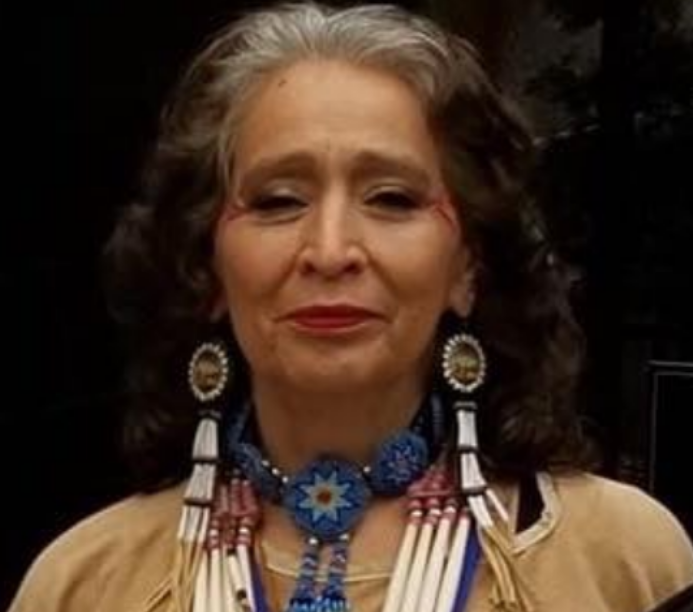
- Details
- By Darren Thompson
FT. YATES, ND—LaDonna Brave Bull Allard, one of the leaders of the Standing Rock Sioux Tribe’s fight against the Dakota Access pipeline, a Standing Rock Sioux tribal citizen and an undisputed Lakota historian, passed away on Saturday from brain cancer. She was 64.
Her family made an announcement on social media on Saturday. She had been fighting brain cancer and had undergone extensive brain surgery in Jan. 2020. Only weeks ago, she announced the cancer was in remission.
Allard was one of the leaders of the one of the largest gathering of Indigenous peoples in over a hundred years. In April 2016, she was one of the founders of the Sacred Stones Camp, which was the first resistance camp aimed at stopping the Dakota Access Pipeline in Cannonball, North Dakota on her family’s land.
Because of her leadership at Standing Rock, she quickly gained national acclaim. In the midst of the fight against the Dakota Access pipeline, she reflected on why stopping the pipeline was important to her.
"Two years ago, when Dakota Access first came, I looked at the pipeline map and knew that my entire world was in danger,” she wrote in YES! Magazine. “If we allow this pipeline, we will lose everything. We are the river, and the river is us. We have no choice but to stand up.”
After construction began near the Standing Rock Indian Reservation in August 2016, LaDonna placed an open invitation for supporters to come join the Tribe’s efforts to stop the pipeline. People throughout the world traveled to the Standing Rock Indian Reservation to support and witness construction. Many American Indian tribes and organizations, politicians, environmental groups and civil rights groups joined the effort to support the resistance at Standing Rock.
Among the allies showing their support of the Standing Rock Sioux Tribe were the Black Lives Matter movement, Indigenous leaders from the Amazon Basin of South America, Vermont Sen. Bernie Sanders, the 2016 Green Party presidential candidate Jill Stein, and thousands of other people.
“LaDonna was an extraordinary individual who showed love to everyone and her passing is a significant loss to Indian Country,” North Dakota State Representative Ruth Buffalo said to Native News Online. “Her courage was contagious and inspiring. She was very knowledgeable of the extensive history of the land and worked to preserve our history and sacred sites.”
For her efforts in leading one of the largest protests in modern history, Allard has been awarded the 2019 William Sloane Coffin Jr. Peacemaker Award, appeared on major television networks in the United States and beyond, presented at numerous summits, conferences, universities and to the United Nations on the efforts to stop the Dakota Access pipeline.
“My heart is saddened to hear of the passing of LaDonna Tamakawastewin Allard,” South Dakota state Sen. Red Dawn Foster said to Native News Online. “She inspired the world with her love for the water, the land, the people, and the love she shared with her husband Miles.”
Allard graduated away from the University of North Dakota with a degree in history. She became the Standing Rock Sioux Tribe's tourism coordinator.
She was preceded in death by her husband, Miles Allard, who passed on in Feb. 2018.
Her service has been announced next weekend in Fort Yates, North Dakota. For donations, the family is asking to send to 202 Main Street, Fort Yates, ND 58538 or PO Box 670, Fort Yates, ND 58538.
More Stories Like This
Native News Weekly (August 25, 2024): D.C. BriefsSAVE THE DATE: GVSU’s “Celebrating All Walks of Life” Powwow Set for April 4th
Monday Morning: (February 16, 2026): Articles You May Have Missed This Past Weekend
US Presidents in Their Own Words Concerning American Indians
Osage Nation Mourns the Passing of Former Principal Chief Jim Gray
Help us defend tribal sovereignty.
At Native News Online, our mission is rooted in telling the stories that strengthen sovereignty and uplift Indigenous voices — not just at year’s end, but every single day.
Because of your generosity last year, we were able to keep our reporters on the ground in tribal communities, at national gatherings and in the halls of Congress — covering the issues that matter most to Indian Country: sovereignty, culture, education, health and economic opportunity.
That support sustained us through a tough year in 2025. Now, as we look to the year ahead, we need your help right now to ensure warrior journalism remains strong — reporting that defends tribal sovereignty, amplifies Native truth, and holds power accountable.
 The stakes couldn't be higher. Your support keeps Native voices heard, Native stories told and Native sovereignty defended.
The stakes couldn't be higher. Your support keeps Native voices heard, Native stories told and Native sovereignty defended.
Stand with Warrior Journalism today.
Levi Rickert (Potawatomi), Editor & Publisher
